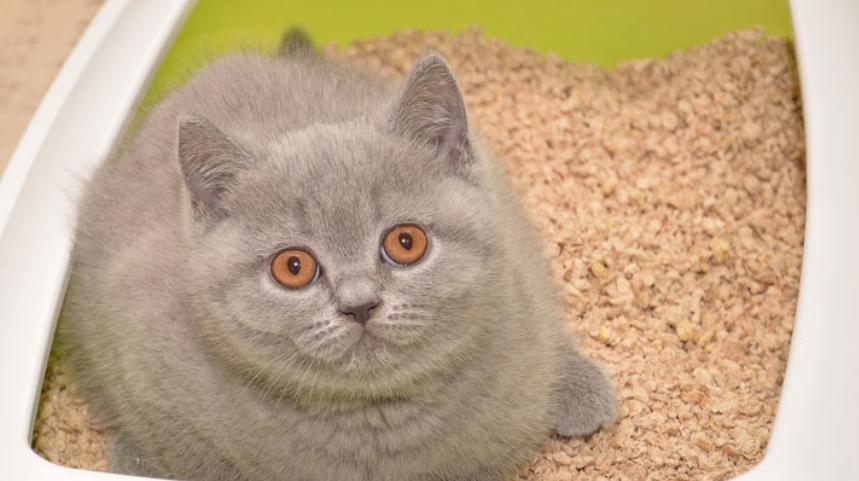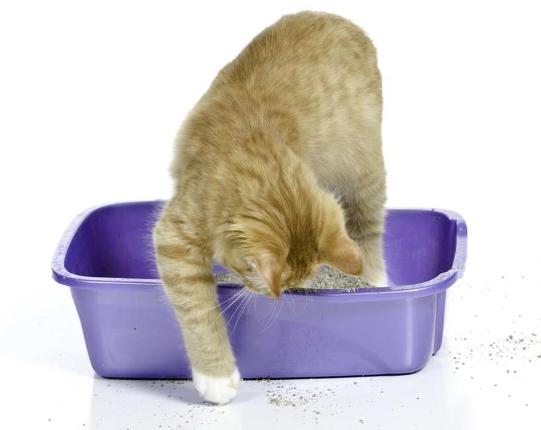If your cat is avoiding the litter box, it’s important to understand the reasons behind this behavior. Cats are typically clean animals, so when they stop using their litter box, it’s often a sign of an underlying issue. From health conditions to stress or even preferences in the type of litter, there are various reasons why is my cat not using the litter box. Identifying the cause is crucial to finding the right solution. In this guide, we’ll explore the top five reasons why cats avoid their litter box and provide practical solutions to help resolve the problem.

Reason 1: Medical Conditions
When a cat stops using the litter box, the first thing to consider is a potential medical issue. Health problems can make using the box uncomfortable or painful, leading your cat to avoid it altogether.
Urinary Tract Infections
Urinary tract infections (UTIs) are one of the most common reasons for litter box avoidance in cats. A UTI causes pain and discomfort during urination, which can make your cat associate the litter box with this pain. As a result, they may choose to urinate elsewhere. If you notice your cat is urinating outside the box, making frequent trips to the litter box, or straining to urinate, they may have a UTI. A visit to the vet is necessary to confirm the diagnosis and begin treatment with antibiotics.
Arthritis and Mobility Issues
Older cats or cats with arthritis may have difficulty getting in and out of the litter box, particularly if it has high sides. Cats with mobility issues may avoid the litter box because they find it too difficult to access. If your cat has arthritis or other joint problems, try switching to a litter box with lower sides or providing steps to make it easier for them to get in and out of the box. Offering a softer surface inside the box, such as a smooth, low-dust litter, may also help alleviate discomfort.
Diabetes or Other Illnesses
Certain medical conditions, such as diabetes, hyperthyroidism, and kidney disease, can cause increased thirst and urination in cats. If your cat is drinking more water than usual and having more frequent urination accidents outside the box, these conditions may be to blame. A vet can diagnose these illnesses through blood tests and urine samples. Once the underlying condition is treated, your cat should return to their regular litter box habits.
Reason 2: Dirty Litter Box
Cats are very particular about cleanliness, and a dirty litter box can easily cause them to avoid using it.
Importance of Daily Cleaning
Keeping the litter box clean is essential to maintaining your cat’s litter box habits. Cats will avoid a box that is filled with waste, so it’s important to scoop out the litter box at least once a day. Some cats are more particular than others, and if they find the box dirty, they will simply choose another spot to relieve themselves. Regular daily cleaning ensures that the box remains appealing to your cat and prevents accidents from occurring elsewhere in the house.
How Often Should You Change the Litter?
In addition to daily scooping, you should change the entire litter and clean the box itself at least once a week. If you have multiple cats or a particularly picky cat, you may need to change the litter more often. A full litter change prevents the buildup of odors and bacteria, making the box more inviting for your cat. Be sure to clean the box with mild, unscented soap to avoid strong smells that might deter your cat.
Using Deodorizers to Control Smell
While it’s tempting to use deodorizers or scented litters to control litter box odors, these products can sometimes cause more harm than good. Cats have a highly sensitive sense of smell, and strong fragrances can be overwhelming for them. Instead of masking odors with deodorizers, focus on regular cleaning and consider using unscented litter. If odor control is an issue, you might also consider adding an additional litter box to your home to distribute usage.
Reason 3: Wrong Litter Type
The type of litter you use can make a big difference in whether your cat is comfortable using the box.
Clumping vs. Non-Clumping Litter
Clumping litter is a popular choice because it makes it easier to remove waste and keeps the box cleaner for longer periods. However, some cats prefer non-clumping litter, particularly if they have allergies or sensitive paws. If your cat is avoiding clumping litter, try switching to a non-clumping variety or a natural litter like wood, corn, or paper-based options to see if it makes a difference.
Scented vs. Unscented Litter
Many litters come with added scents to help mask odors, but cats typically prefer unscented litter. Strong fragrances can deter your cat from using the litter box, as their sensitive noses can find it overwhelming. If you’re using scented litter and your cat is avoiding the box, try switching to an unscented variety. It’s always a good idea to let your cat’s preferences guide your choice.
Cats with Allergies or Sensitivities
Some cats may have allergies or sensitivities to certain types of litter, especially those that produce a lot of dust. Dusty litters can irritate your cat’s respiratory system or cause skin irritation, leading them to avoid the box. If you suspect your cat has an allergy or sensitivity, switch to a dust-free or hypoallergenic litter. Natural litters made from materials like walnut shells or recycled paper can be a good alternative.
Reason 4: Stress or Anxiety
Stress is another common cause of litter box avoidance. Changes in your cat’s environment can cause anxiety, which may lead them to avoid the box.
Environmental Changes
Cats are creatures of habit, and they tend to thrive in stable environments. When major changes occur—such as moving to a new home, redecorating, or even rearranging furniture—your cat may become stressed and avoid using the litter box. Cats feel most secure in familiar surroundings, so any disruption to their environment can cause them to act out. To help your cat adjust, provide plenty of familiar objects, such as their favorite bedding or toys, and keep the litter box in a consistent, quiet location.
New Pets or Family Members
The introduction of a new pet or family member can also trigger stress in cats. Cats are territorial animals, and the presence of a new pet or person can make them feel threatened or insecure. This anxiety may lead to inappropriate elimination as they try to mark their territory or cope with the changes. If you’re bringing a new pet or person into the home, introduce them to your cat gradually and ensure your cat still has access to their favorite spaces and resources.
Solutions for a Calm Space
Creating a calm and secure space for your cat can help alleviate stress and encourage litter box use. Make sure your cat has a quiet, comfortable area where they can retreat when they feel overwhelmed. You might also consider using calming pheromone diffusers or sprays to reduce anxiety. These products mimic the natural calming signals that cats produce and can help your cat feel more at ease.
Reason 5: Territorial or Behavioral Issues
Cats are territorial by nature, and conflicts with other pets or behavioral changes can lead to litter box problems.
Multiple Cats and Litter Box Competition
In multi-cat households, competition over litter boxes can be a significant problem. Cats may feel uncomfortable sharing a litter box, especially if there are too few boxes available. The general rule is to have one litter box per cat, plus one extra. This reduces competition and ensures that each cat has a designated spot to relieve themselves. If your cats are competing for litter box space, adding more boxes around the house can help resolve the issue.
Inappropriate Marking Behavior
Cats may also avoid the litter box due to territorial marking. Territorial marking usually involves urinating outside the box to mark their territory. This behavior is more common in unneutered males but can occur in any cat, especially in multi-cat households or when the cat feels threatened by a new animal or person. Spaying or neutering your cat can reduce marking behaviors, and providing multiple litter boxes can help address territorial disputes.
Adding More Litter Boxes to the Household
Sometimes, the solution to litter box avoidance is simply to add more litter boxes to your home. If your cat is avoiding the litter box because they don’t like sharing with other pets, providing additional boxes in different areas of the house can make a big difference. Be sure to place boxes in quiet, private locations where your cat feels comfortable.

Conclusion
If your cat is not using the litter box, identifying the root cause is essential for finding a solution. Whether the issue is medical, behavioral, or related to the environment, there are steps you can take to resolve it. Why is my cat not using the litter box could be due to factors like cleanliness, litter type, or stress. Keeping the litter box clean, choosing the right type of litter, and providing a calm, safe environment for your cat can go a long way in solving litter box problems. If issues persist, consulting a veterinarian is always a good idea to rule out any underlying health concerns.
FAQs
How can I retrain my cat to use the litter box?
To retrain your cat, start by making sure the litter box is clean and in a quiet, easily accessible location. Positive reinforcement, such as treats and praise, can help encourage your cat to use the box. You may also want to switch to a litter type your cat prefers or try using a different box altogether.
Should I punish my cat for not using the litter box?
No, punishment is not effective and can actually make the problem worse. Instead of punishing your cat, focus on identifying the cause of the behavior and addressing it. Patience, positive reinforcement, and understanding are the best tools for solving litter box issues.
Can changing the location of the litter box help?
Yes, sometimes relocating the litter box to a quieter, more private area can make a big difference. Cats prefer a peaceful environment for their bathroom habits, so moving the box away from noisy or high-traffic areas can encourage better usage.
